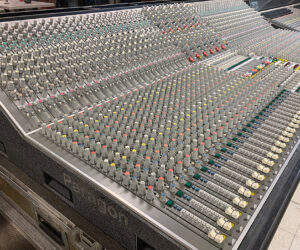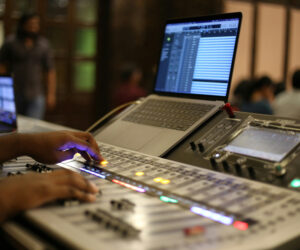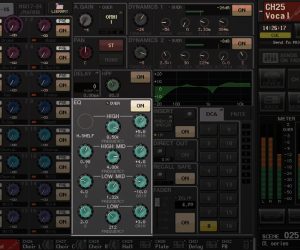Sometimes it’s not so easy for us “gray hairs” to realize or accept that our careers are more in the past now than ahead of us. I’ve been in this business for 30 years and it’s unlikely I’ll be doing this for another 30 unless they find that fountain of youth buried somewhere in the swamps of Florida…
One thing we veterans can do is to look back and take stock in the “lessons learned” and, with our perspective, decide which of them are the most important. Here’s my list, and I encourage you to either make your own and share it (for veterans) or, if you’re new to this business, think hard about these issues so maybe you won’t have to learn most everything the hard way like we did.
One. When I was just out of school and trying to have a job, any job, in professional audio, I lived in LA and worked for a company in Burbank that sold and serviced professional audio equipment. It was a wacky place run by a pretty wacky guy.
I started as the assistant service tech and worked for a really smart person, although I forget his name now. Part of the reason for that is that I was there for about a week before he quit. So, then I became the service manager without really being qualified. I had a pretty good formal education, but no experience.
So, one day I called one of my best teachers, Thomas “Beno” May (I’d studied electronics and equipment maintenance with him at the University of Southern California) to complain to him about my situation. He had sage advice for me: “There’s always a lesson to be learned from every situation – the key is to figure out what it is.”
Perhaps that seems simplistic but I took it to heart and decided I would make the most of things as they were. I ended up servicing noted violinist Jean-Luc Ponty’s recording console and otherwise drove all over LA to align tape machines and fix things at various studios, meeting a lot of people and learning a great deal. I was a couple steps above “no experience” by the time I joined the Air Force a year or so later.
Two. Speaking of being in the Air Force, I toured with their big band jazz ensemble the Airmen of Note. A couple of times we performed at the Pensacola Jazz Festival. At one of the after parties, at a famous local bar, some members of the band were sitting in with the house band and really throwing out the jams. I “sat in” at the mixing console and proceeded to start doing some of the worst mixing of my life, mainly because I was consuming numerous mudslides – the house specialty.
The bottom line? Never mix while drinking. I lost my sense of what was appropriate in the mix and turned up the high frequencies more and more – it literally cleared the bar! And I’ve never drank and mixed since.
Three. This is a big one if you’re fortunate enough to mix monitors or front of house: the most important thing in the world is what is happening on stage right now. Never let your attention go somewhere else (pretty girl or guy, your phone, all the blinking lights, etc.) If someone is walking up to a solo mic or trying to get your attention from the stage, you need to know and react in real time, not 30 seconds later after someone runs up yelling at you.
I was just reminded of this again on a gig where I was a musician at an upscale affair on New Year’s Eve. The director wanted to talk between numbers – normally not a big deal. But several times, we finished, there was applause, and he picked up the mic to talk to the audience – and nothing came out. Whoever was responsible was not doing their job and we were all embarrassed for that person. Simply unprofessional!
Four. People skills and diplomacy matter a lot. Some of this is personality, some is experience, but the goal must be to work well with others and have them feel that they are on the team and their contributions matter.
Not to say that any of us should have to put up with BS – we shouldn’t. But we must all find creative and constructive ways of dealing with it. I think it was in Houston once at a performing arts center when I was on tour with the Airmen of Note, and we had counted on a house center cluster since we only had ground stacks. This place had three balconies! We arrived and were told “the house cluster doesn’t work.”
I was rather less than polite about it when I should have just focused on potential solutions. We ended up figuring out that we could set up the stacks to cover the floor and the first two balconies more than adequately and asked the staff at the center to rope off the third balcony. In the end it worked just fine, and we even received compliments on the sound quality and the coverage.
Five. Our biases impact the end product, like it or not. Our favorite microphone or loudspeakers or place to put the monitor wedges may or may not be ideal for the room, the instrument, the artist or the situation. It’s fairly easy to fall into the trap of thinking “I have to use such and such microphone” when the truth is that if we can’t mix a decent show with the front person on a SM58, we probably shouldn’t be in this business.
Of course we have our favorites, and most certainly the microphones we use can have a huge impact on the end result, but we shouldn’t be splitting hairs, either, especially if we’re counting on the house to provide the gear. Even if we bring our own KMS105, it’s important to be ready to admit sometimes that it just isn’t right for some rooms. And the difference between power amplifiers? Don’t even get me started…
OK – to be honest, it was tough to whittle this list down to only five lessons – there are certainly many more. Maybe I’ll come up with a Part 2 sometime. And, I’d enjoy learning of your “lessons learned” as well! Have a great gig and keep an open mind.















